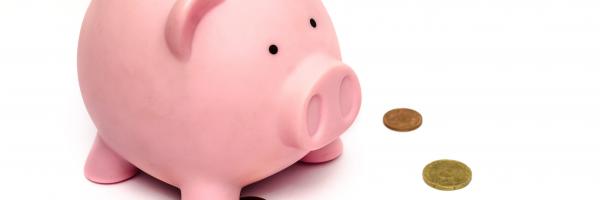Take a course!
- quickly reduce anxiety & begin to feel more confident with money
- implement simple systems, saving time & money with easy to follow money tips
- start paying off debt, build emergency savings & security
One thing that I really can't cope with is when something is a waste of money! I like to get good value for money, but that doesn't mean that I like cheap stuff, or that I am not prepared to spend money. It simply means that for every penny that I DO spend, I like to get a good return for it. That might mean spending a bit more on a quality item that will last for years, as opposed to a cheap one that will get thrown in the bin next week.
We will each have different ideas about what is good value and what is a waste of money, but there is one thing that can really encourage us all to waste our money.
Consumerism!
Everywhere we look there are adverts! We are bombarded with awesome offers, brilliant bargains and once-in-lifetime sales that make us think we cannot live without the latest amazing product (or should that be the biggest waste of money!). Quietly browsing Facebook and that bag that you were looking at earlier suddenly pops up in your news feed. It's a sign; it's meant to be. Two clicks later and you are the proud owner of a brand new bag that you didn't need, but that seemed too good to miss.
I am currently being bombarded with adverts for this gorgeous jacket, for which I just can't justify the price, despite loving it! If North Face is looking for a blogger to try it out for them though, I am your woman!

Competition
As well as advertising from companies, social media encourages us to spend more in other ways.
Competitive spending, or keeping up with the Joneses is a problem for many. Our friends used to all go off camping each year, and "competition camping" became a standing joke amongst them.
Setting up the tents was a race, so they could see whose new gadget was the best. Fairy lights, wine glass holders, portable hanging speakers, the best camping chairs and loads of other camping "essentials". The competition grew year on year until they had to buy trailers just to transport their equipment and it took them practically the whole day to set up camp.
Now, for me, this is just a funny story that always makes us laugh and genuinely is a standing joke. They could afford to do this and everything that they bought they used time and time again, so it wasn't a waste of money.
Covet
However, this type of thing is alive and well in everyday life and it can affect peoples' finances really badly. For many, looking on social media at what others have got, is enough to make them unsatisfied with their own lives in so many ways.
"Have you seen so-and-so's outdoor living area? It's amazing!"
"Their living room is nicer than mine."
"I love their new car - we could do with something like that."
That coffee machine. The latest trainers. A new holiday resort. A gorgeous new top. Suddenly purchasing new items is top of the agenda and you feel that you won't be happy until you have it.

However, does it make you happy in the long run or is it a waste of money?
I asked some of the UK's best money bloggers to give us their thoughts on habits that helped them to avoid wasting money.
Lee at Homely Economics said they changed their ways and found "My best money habit has been tracking my income and expenses to the penny. My husband and I started when we were saving for a house deposit, and it sharpened our understanding of our finances, but more importantly, it trained us to think carefully about our spending. Now, we don't need to do it as rigidly as before, but the frugal thinking pattern has stuck with us!"
The Queen of Clean suggests that many of us waste money on cleaning products, and has some great suggestions for cutting the cost of this.
A common problem
Consumer overspending, especially on cars, does not impress Sara from Debt Camel. "A car is a means of transport, not a status symbol. My best money habit is keeping a car for as long as possible. My last car was 14 years. I'm hoping the current one will last that long too!
Doing this saves a fortune on depreciation and also some money on insurance in the later years." She suggests that you should compare the best ways to buy a car to avoid it being a waste of money.
I laughed at Faith from Much More with Less, who said: "I have a tendency to procrastinate at the best of times, but that can come in handy when we're trying to live on a budget."
She has great advice on avoiding the pressure to spend "If I see something I want to buy - I hold off till the next day (or later). Often, if it's not something we really need, the desire will pass. If I still want it, I check online and elsewhere to see if we can get it cheaper. This helps to cut spending massively."
Home improvements are another area where we can be pressurised into spending more than we mean to, so check out this great post from Emma about how to save money when buying a kitchen.
Advertising
As well as social media putting pressure on us to spend, the shops are amazing at persuading us that we really need to part with our hard-earned cash.
Francesa blogs at From Pennies to Pounds and says "My best money habit would be avoiding the shops. If you go to the shops, you will often see something that you want to buy, and this leads to impulse buying. No spend days can really help you to see the pattern of this, and encourage you to stop. 99% of my days are no spend days now!"
"I would say that my best habit would to be very aware of how we are manipulated to want stuff," says Lesley who blogs at Thrifty Lesley. "Buy a coffee, buy this lovely cake, what? you're wearing last years clothes, change your sofa, your walls look out of date, decorate and that old chestnut 'this seasons must-haves'. Stay focused on your goal or you'll spend all your income on fripperies."

Does it matter?
But so what if you overspend on random crap or are dragged into a spending competition with neighbours, friends or random folk that you don't even know on social media?
What does it matter?
For some, it matters because they end up in debt, lots of it! And that means that they end up spending way more because as well as paying for the item, they are also paying interest charges.
For others, it may mean that they are not spending on the thing that is important to their long-term security. Investing in themselves!
Pay yourself first
Michelle blogs at Time and Pence and, for her, both short and long term security is a real priority. "My best money habit has been to always have my mortgage on a fixed rate for security and save up as much as possible for each time it came to the end of the term to pay off the extra. This has allowed me to pay off my mortgage early. Our last payment is in January 2018!"
What could you do with the extra money you would have if you had finished paying off your mortgage? Is it perhaps worth avoiding things that could be a waste of money now, to allow you to live a mortgage-free life?
Emma from The Money Whisperer is also focused on her long-term security. "By starting to save for a pension as soon as I started earning money rather than deferring in those early years, I got into a good habit of saving a portion of each month's earning for old age. When we lived in Australia, there was a government-mandated pension saving rate of 9% so I've aimed for this rate since I've been back in the U.K. Saving each month for retirement is not only a good habit but the earlier you start, the more growth you can expect too."
And finally
If some of these ideas have motivated you to think that you could be making more of your money, then why not make a spending plan today? I bet you could easily shave £100 off your monthly spending, simply by getting to know your figures.

I hope that you have found these tips from the UK Money Bloggers helpful. I would love to hear your thoughts, so please feel free to comment below.
Eileen x

I am Eileen Adamson, Your Money Sorted coach, working online with UK based women. I can help you to develop a better relationship with money and feel calm, relaxed and positive about money. This will allow you to feel confident, in control and able to make good financial decisions. Through creating a good relationship with money you can then live the life that YOU want to lead.









